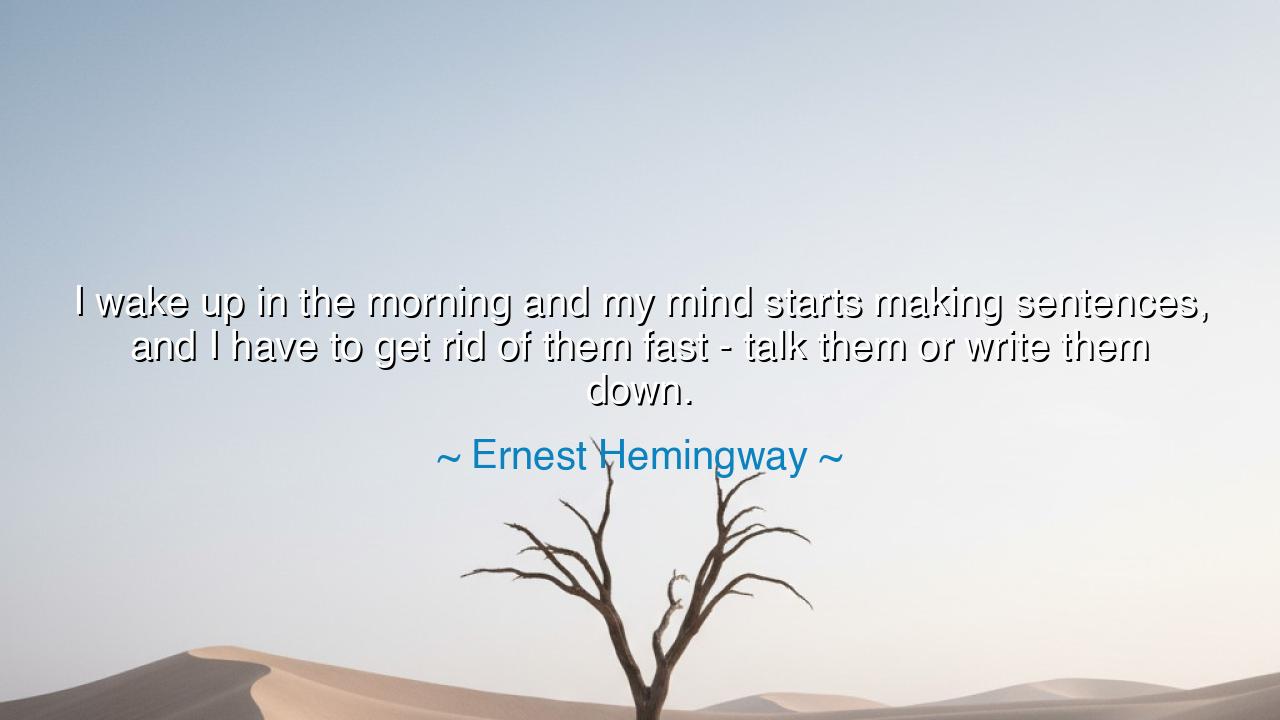
I wake up in the morning and my mind starts making sentences
I wake up in the morning and my mind starts making sentences, and I have to get rid of them fast - talk them or write them down.






When Ernest Hemingway confessed, “I wake up in the morning and my mind starts making sentences, and I have to get rid of them fast—talk them or write them down,” he was revealing not a mere habit, but the very nature of a creator’s soul. His words are not casual; they describe the torrent of thought that seizes an artist upon waking, a flood of language that demands release. For in the dawn, when the world is quiet, the mind of the writer is already ablaze, shaping words, forging rhythm, building truth. To keep such words within is to suffer; to write them down is to be freed.
The origin of this quote lies in Hemingway’s own discipline and creative fire. Known for his terse, powerful style, he was a man who believed in writing with urgency, stripping language to its raw bones. His mornings were not leisurely beginnings, but battles against silence. The sentences that sprang into his mind were like wild horses—if not captured quickly, they would vanish into the wind. This urgency to “get rid of them fast” reveals the sacred duty of the artist: to serve as a vessel through which ideas flow, not hoarded but released.
This struggle between thought and expression has echoed across history. Consider Samuel Taylor Coleridge, who once dreamt of an entire poem, “Kubla Khan,” and began to write it, only to be interrupted by a visitor. When he returned to his desk, the vision had fled, lost forever. From this we learn the truth of Hemingway’s words: ideas are fleeting, and the writer must be swift to record them before they dissolve. To wake and immediately write is not obsession but survival, for the imagination does not wait for leisure or convenience.
Hemingway’s declaration also speaks of the burden of creativity. Those who do not bear this gift may not understand it. To them, sentences are formed by will, summoned when needed. But to the artist, they come unbidden, filling the mind like an overflowing vessel. To hold them back is to feel restlessness, even pain. Thus, Hemingway’s mornings were not peaceful retreats but urgent flights toward paper and pen, a daily exorcism of the imagination’s fire.
Yet within this urgency lies a deep joy. Hemingway speaks of his mind as fertile, restless, alive. Each sentence is a gift, a spark of life demanding to be shared. His act of writing was not simply craft but communion—a way of speaking to himself, to the world, and perhaps to eternity. In this way, the quote is both humble and profound: a recognition that the artist does not own the words, but only channels them. The writer is not a master of language, but its servant.
The lesson here, O seekers, is clear. When inspiration comes, seize it. Do not wait for a perfect moment or polished plan. Whether your gift is writing, painting, music, or invention, learn to honor the flashes of dawn that visit you. Carry a notebook, prepare your tools, and respond quickly when your mind begins to overflow. For hesitation is the thief of creation, and countless masterpieces have been lost to delay.
So let Hemingway’s words resound in your heart: “I have to get rid of them fast—talk them or write them down.” They are a call to discipline, to readiness, to courage in expression. Do not let your sentences, your ideas, your visions rot unspoken within you. Free them, give them form, and let them breathe. For the thoughts that wake you in the morning may be the very truths the world is waiting to hear.






AAdministratorAdministrator
Welcome, honored guests. Please leave a comment, we will respond soon